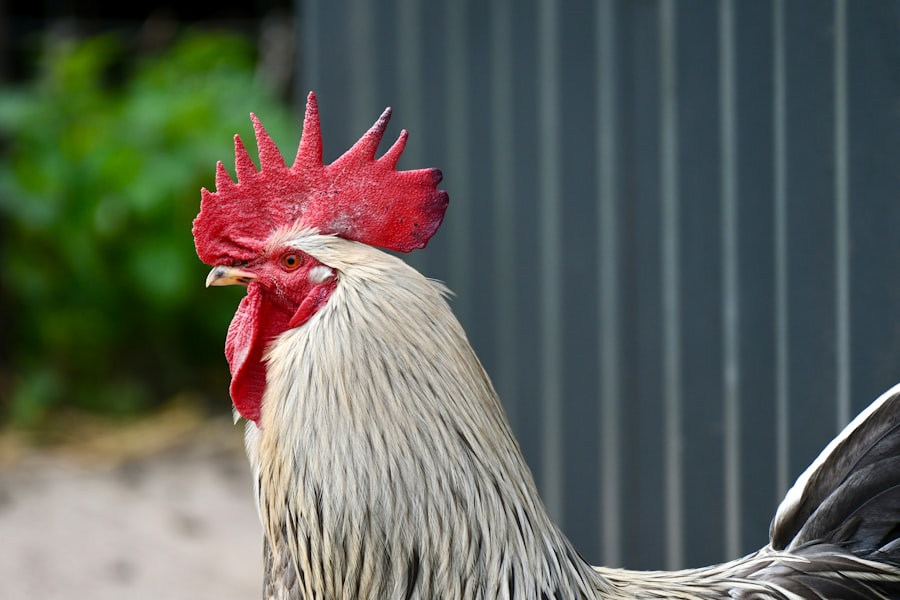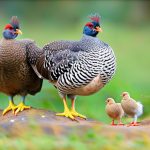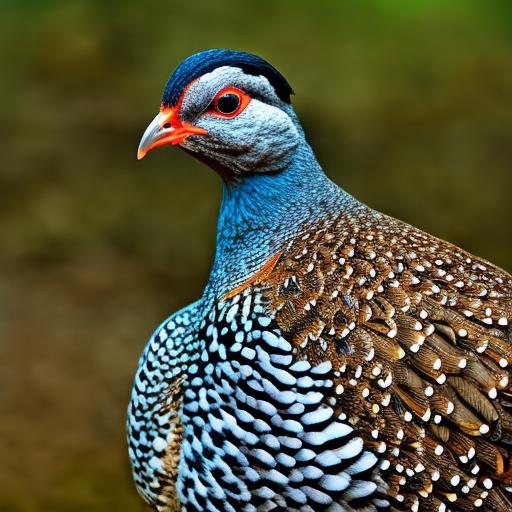Guinea fowl, also known as pintades, are a type of bird native to Africa. They are closely related to other game birds such as pheasants and turkeys. Guinea fowl are known for their distinctive appearance, with speckled feathers and a helmet-like bony structure on their heads. They are also prized for their delicious, lean meat and are often raised for consumption. However, one of the lesser-known but incredibly valuable qualities of guinea fowl is their ability to act as natural predators, particularly when it comes to controlling snake populations.
Guinea fowl are social birds that prefer to live in flocks, making them an ideal addition to a farm or homestead. They are hardy and adaptable, able to thrive in a variety of climates and environments. In addition to their pest control abilities, guinea fowl are also known for their loud, distinctive calls, which can serve as an effective alarm system to alert farmers to potential threats. Overall, guinea fowl are fascinating and useful birds that have a lot to offer beyond just their tasty meat.
Key Takeaways
- Guinea fowl are domesticated birds known for their pest control abilities and unique appearance.
- Guinea fowl are natural predators of insects, ticks, and small rodents, making them valuable for pest management in agricultural settings.
- Guinea fowl are effective snake deterrents due to their loud calls, alert nature, and ability to mob and chase away snakes.
- Guinea fowl exhibit vigilant behavior and will alert others in the flock of potential snake threats, making them a valuable asset in snake control.
- Keeping guinea fowl can provide natural and sustainable snake control, reducing the need for chemical pesticides and other control methods.
Guinea Fowl as Natural Predators
Guinea fowl are highly effective natural predators, particularly when it comes to controlling snake populations. Their keen eyesight and quick reflexes make them adept at spotting and catching snakes, making them a valuable asset for farmers and homesteaders looking to keep their properties free of these potentially dangerous reptiles. Guinea fowl are known to actively seek out and consume snakes, including venomous species such as rattlesnakes and copperheads. Their aggressive behavior towards snakes makes them an invaluable ally in snake control efforts.
In addition to their ability to catch and consume snakes, guinea fowl also serve as a deterrent to snakes in the first place. The loud calls and aggressive behavior of guinea fowl can discourage snakes from entering an area, making them an effective form of natural pest control. This makes guinea fowl an excellent choice for farmers and property owners looking for a safe and environmentally friendly way to manage snake populations without resorting to harmful chemicals or traps.
Snake Deterrent Qualities of Guinea Fowl
Guinea fowl possess several qualities that make them effective deterrents for snakes. Their loud calls and alert nature make them highly vigilant and capable of detecting the presence of snakes in their environment. When guinea fowl spot a snake, they will often emit loud alarm calls and engage in aggressive behavior towards the snake, effectively driving it away from the area. This behavior serves as a warning to other guinea fowl in the flock, as well as other animals in the vicinity, alerting them to the potential threat.
Furthermore, the presence of guinea fowl on a property can create an inhospitable environment for snakes. Guinea fowl are known for their territorial behavior and will actively patrol their territory, making it difficult for snakes to establish themselves in the area. The combination of their aggressive behavior and territorial nature makes guinea fowl an effective deterrent for snakes, helping to keep properties free from these potentially dangerous pests.
Guinea Fowl Behavior and Snake Interaction
Guinea fowl are highly social birds that prefer to live in flocks, which can consist of dozens of individuals. This social structure allows them to effectively communicate and work together to protect their territory from potential threats, including snakes. When a guinea fowl detects a snake, it will emit loud alarm calls to alert the rest of the flock, prompting a coordinated response to drive the snake away. This behavior not only helps to protect the guinea fowl themselves but also serves as a valuable form of pest control for the property as a whole.
In addition to their vocal warnings, guinea fowl will also engage in physical displays of aggression towards snakes. They may puff up their feathers, spread their wings, and charge at the snake in an attempt to intimidate and drive it away. This aggressive behavior is highly effective at deterring snakes and preventing them from establishing themselves in the area. Overall, the behavior of guinea fowl when interacting with snakes is a key factor in their effectiveness as natural predators and deterrents.
Benefits of Keeping Guinea Fowl for Snake Control
There are numerous benefits to keeping guinea fowl for snake control on a property. Firstly, guinea fowl provide a natural and environmentally friendly form of pest control, reducing the need for harmful chemicals or traps. This can be particularly beneficial for organic farms or properties where chemical use is limited or prohibited. Additionally, guinea fowl are low-maintenance birds that require minimal care and can thrive in a variety of environments, making them a practical and cost-effective solution for snake control.
Furthermore, the presence of guinea fowl on a property can provide additional benefits beyond just snake control. Their loud calls and vigilant nature make them effective watchdogs, alerting property owners to potential threats or intruders. Additionally, guinea fowl are prolific insect-eaters and can help to control populations of other pests such as ticks and grasshoppers. This multifaceted approach to pest control makes guinea fowl a valuable addition to any farm or homestead.
Considerations for Using Guinea Fowl as Snake Deterrent

While guinea fowl can be highly effective at controlling snake populations, there are some important considerations to keep in mind when using them as a deterrent. Firstly, guinea fowl are social birds that prefer to live in flocks, so it is important to provide them with adequate space and shelter to thrive. Additionally, their loud calls and active nature may not be suitable for all environments, so it is important to consider the potential impact on neighbors or nearby properties.
Furthermore, while guinea fowl are generally hardy and adaptable birds, they may be susceptible to predation from other animals such as foxes or hawks. It is important to take steps to protect the guinea fowl from potential predators, such as providing secure housing and ensuring that they have access to safe areas where they can roost at night. Overall, while guinea fowl can be an effective form of snake deterrent, it is important to carefully consider the specific needs and requirements of these birds before introducing them to a property.
Conclusion and Recommendations
In conclusion, guinea fowl are fascinating and valuable birds that offer numerous benefits beyond just their tasty meat. Their natural predator instincts and aggressive behavior towards snakes make them an effective form of pest control for properties looking to manage snake populations in a safe and environmentally friendly manner. However, it is important for property owners considering using guinea fowl as a snake deterrent to carefully consider the needs and requirements of these birds before introducing them to their property.
Overall, guinea fowl are an excellent choice for farmers and homesteaders looking for a natural and sustainable solution for controlling snake populations. Their ability to act as natural predators and deterrents for snakes, combined with their low-maintenance nature and additional benefits such as insect control and alarm systems, make them a valuable addition to any property. With proper care and consideration, guinea fowl can be an effective and practical solution for managing snake populations while providing numerous other benefits for the property as a whole.
Sure, here’s a paragraph with the related article included as an tag:
If you’re considering keeping guinea fowl to protect your chickens from snakes, you might also be interested in learning how to convert a shed into a chicken coop. This article from Poultry Wizard provides valuable insights on the process: Convert Shed to Chicken Coop. Additionally, understanding the importance of the floor of your chicken coop is crucial for the health and safety of your flock. Check out this informative piece on the topic: Floor of Chicken Coop. Lastly, if you’re in the market for a new chicken coop, the Producers Pride Sentinel Chicken Coop is worth considering. Learn more about its features and benefits here: Producers Pride Sentinel Chicken Coop.
FAQs
What are guinea fowl?
Guinea fowl are a type of bird native to Africa. They are known for their distinctive spotted feathers and loud, chattering calls.
Do guinea fowl keep snakes away?
Guinea fowl are known to be effective at keeping snakes away from an area. Their loud calls and alert nature make them good at spotting and deterring snakes.
How do guinea fowl keep snakes away?
Guinea fowl are known to be aggressive towards snakes, and will often mob and attack them if they encounter one. Their loud calls also serve as a warning to other birds and animals in the area.
Are guinea fowl a good natural pest control option?
Yes, guinea fowl are known to be effective at controlling insect and rodent populations. They are often used on farms and in gardens to help keep pests in check.
Are there any downsides to using guinea fowl for snake control?
While guinea fowl are effective at keeping snakes away, they can be noisy and may not be suitable for all environments. Additionally, they require proper care and housing to thrive.
Meet Walter, the feathered-friend fanatic of Florida! Nestled in the sunshine state, Walter struts through life with his feathered companions, clucking his way to happiness. With a coop that’s fancier than a five-star hotel, he’s the Don Juan of the chicken world. When he’s not teaching his hens to do the cha-cha, you’ll find him in a heated debate with his prized rooster, Sir Clucks-a-Lot. Walter’s poultry passion is no yolk; he’s the sunny-side-up guy you never knew you needed in your flock of friends!




